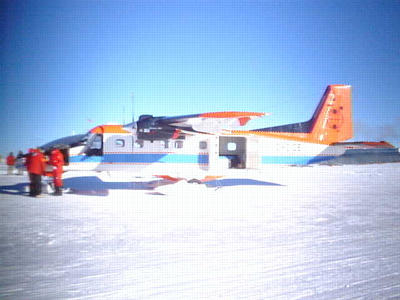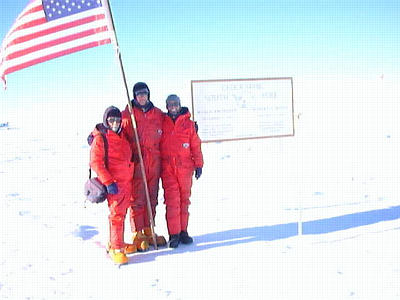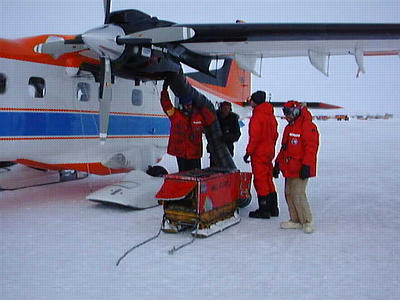31 January, 1999
Saturday, January 30th and Sunday 31st, 1999, South Pole Station
What a weekend this was. The temperatures were down to - 30 C , with
7 knots of wind ( with wind chills - 40C).
During the day I did my laundry, caught up with work in the lab. And
received a good lesson from Joel in running the DOBSON, the instrument
which measures total ozone. Joel and I worked late at ARO's .
The night was long because the arrival time was delayed several times
from 2 am to 5 am. I did not want to miss this important job, so I
stayed up all night and finally caught up answering student's letters.
The German plane arrived at 5:15 a.m. and the emergency team (members
of the community, Joel was one of them) reported to 'Com', the
communication office by 5 am. In the mean time I found out what
happened in the past 48 hours and why the ill person was brought to
the South Pole. This is such a perfect example of what the Antarctic
Treaty is all about: international cooperation without doubts.
The researcher who had a stroke was Indian and was at that time on a
Norwegian charter research vessel off the coast of Antarctica, which
is near the South American coast, close to the Indian station, Dakshin
Gangotri, in the Antarctic. The boat had a helicopter and the
researcher was brought to the South African Station, Sanae. From
there he was brought with a smaller plane to the German station,
Neumayer. The weather was too bad to go across the ocean to South
America or South Africa. In addition, a large plane was required for a
trip like that which was not available. There was no other way but to
go South. McMurdo also agreed that one of their planes (herc) would
bring the person to New Zealand. The time was running fast and help
was so far away. The German plane needed to land at the British
station, Halley, to get more fuel. From there they came non-stop to
the South Pole. They were in the air for 12 hours with only a short
stop at the British Station. Their multiple delay was due to the late
arrival of the South African plane.
We all were worried about the man. When the plane arrived, we followed
Mike's, Instruction. I was asked to approach the plane with him as
soon as the plane was ready to be approached. Everybody had 'walkie-
talkies' to receive orders quickly and everybody knew exactly what
there job was. One group prepared - together with the doctor the
sled and carrier which was to bring the sick man to our medical
station. Another group was ready to carry the man out of the plane.
During that time I stand by - out of the way- and talked to the pilots
if they needed any help. Their English was good, however, they often
said something in German, which I was glad to translate. The patient
was carried carefully out of the plane into our station. According to
the doctor, he was doing well, however, the trip to New Zealand needed
to continue as soon as possible. We were waiting for a Herc (LC 130)
to arrive to bring him to McMurdo and then to New Zealand into a
hospital. However, the plane in McMurdo could not leave because of bad
weather. In the meantime he was well taken care of in our medical
station and everybody did his or her best.
In the mean time, the German plane needed attention as well because
of the cold weather. Usually the planes are not shut down, unless
they stay over night because of bad weather. When they are shut down,
like any other engine here at the South Pole an electrical heating
line has to be connected to their engine. This plane was turned off
and did not start to be put into a parking area. So it stayed on the
main 'taxi way', the area just in front of our station until they
would leave at midnight. There was enough space for the Herc to pass
by.
We were all happy that the patient was well enough to talk. An Indian
researcher from our station was asked to talk to him and helped to
translate. We were exhausted, but also happy that all went well so
far. We also realized that serious medical help is truly far away …
that this is the Antarctic after all.
Because it was Sunday the supporting staff had the day off and brunch
was not until 10:30a.m. However, many people got up, including our
cook, Donna, to prepare breakfast for the crew. They were still busy
taken care of the plane and we finally ate around 8:30 a.m. After that
we brought them ( two pilots, Stefan and Helmut, Henning the mechanic,
and Eberhard, the doctor and station manager) to their quarters. 3 of
them wanted to see some of the station before they would sleep. So I
offered my help and it was fun showing them "my" station.
I went to sleep around noon…. And met all of them for dinner and
showed them together with other German scientists the telescopes at
MAPO. They checked the weather at the German station and left at
midnight. I was in bed by 1:30 p.m. I felt like I was part of a very
important task here in the Antarctic. Let's hope that all will go well
for the patient which was picked up that evening at 7pm to be brought
to McMurdo.


The German Plane arriving at South Pole.

The German team at the Geographical South Pole

The German plane is getting to leave.
Contact the TEA in the field at
.
If you cannot connect through your browser, copy the
TEA's e-mail address in the "To:" line of
your favorite e-mail package.
|
